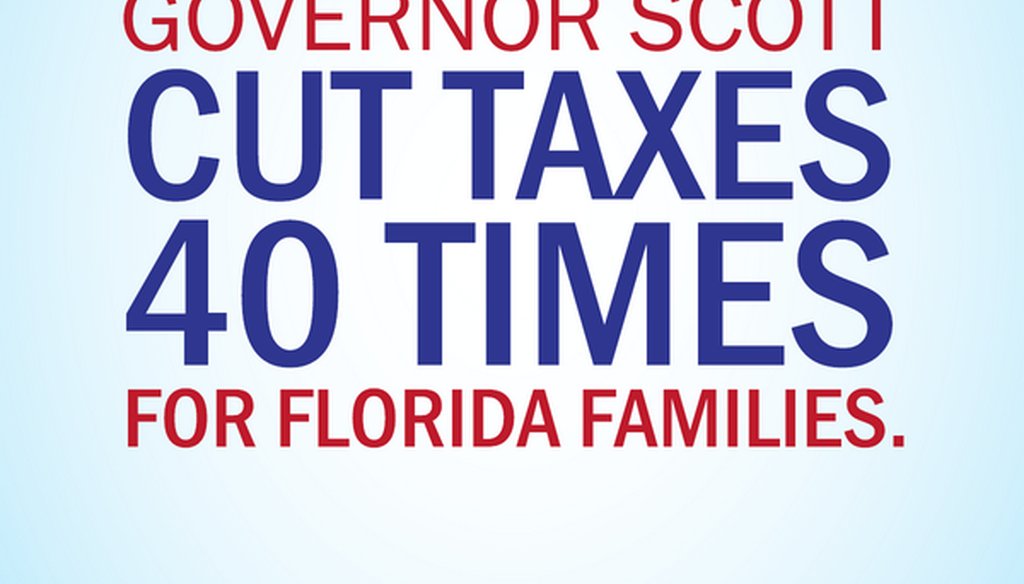Stand up for the facts!
Our only agenda is to publish the truth so you can be an informed participant in democracy.
We need your help.
I would like to contribute

The May 13 tweet featured this image. (via Twitter)
Gov. Scott claims he 'cut taxes 40 times for Florida families'
It seems like just yesterday we were analyzing Gov. Rick Scott’s claim that he had cut taxes for Floridians 24 times. But on May 13, Scott’s campaign raised the count to 40.
"Governor Scott Cut Taxes 40 Times For Florida Families," Scott for Florida announced on Twitter. "40 tax cuts in 4 years. #letskeepworking."
Scott and the Legislature don’t have the budget shortfalls of years past, so tax cuts were the name of the game in Tallahassee in 2014, especially with Scott up for re-election. What were these new cuts he was touting? We hit the lawbooks to find out.
Counting the ways
In 2013, Scott defined a "tax cut" as anything that reduced government revenue by $3 million in a given year. That involved a lot of creative interpretation, such as considering a sales tax holiday a tax cut, then counting it each year. He also ruled reductions in automatic fee increases, tax credits and temporary measures as tax cuts. For 2014, this definition changed slightly, and Scott’s team also counted things that reduced government revenue by less than that.
Sign up for PolitiFact texts
In the 2014 legislative session, freed from having to deal with budget deficits, lawmakers passed two major bills for the governor to tout. One was SB 156, which reduced auto registration fees. The other was HB 5601, a wide-ranging tax cut package that included more sales tax holidays, business tax credits and tax exemptions for child booster seats, college meal plans and even certain pet foods.
After tweeting the good news, Scott’s campaign shared with us their list of 40 items, which actually totaled 41 things. Here’s a closer look at all of them:
1, 2.) Unemployment compensation taxes: Businesses saved $124.5 million when Tallahassee reduced the number of weeks and payout for unemployment compensation in 2011. A tax increase for businesses was rolled back in 2012, although not eliminated. The projected savings were $830 million for tax years 2012 through 2014.
3, 4.) Manufacturing equipment: A 2012 sales tax exemption on machinery purchases was expanded, saving $56 million. The next year the Legislature eliminated the sales tax entirely for three years, starting April 30, 2014. It was slated to cost the state $370 million and local governments $83 million through 2017.
5.) Property taxes: Scott and legislators forced state water management districts (except northwest Florida) to reduce their property tax collections by 30 percent in 2011. The $210 million cut led to modest savings for property owners.
6, 7, 8, 9, 10, 11, 12.) Sales tax holiday: Scott counted the mostly annual tax-free shopping holiday four different times prior to 2013, at a cost of about $30 million to the state. It applied to shoes and clothing (up to $75 per item) and school supply purchases (up to $15). The state has offered the holiday every year since 1998 except in 2002, 2003, 2008 and 2009.
The 2013 tax holiday (Aug. 2-4) counted twice, according to Scott, because it also exempted sales taxes on electronic equipment, such as E-readers, laptops and tablets, up to $750.
For 2014, there will be three sales tax holidays: The first is a nine-day sales tax holiday for hurricane preparation supplies. Starting May 31, Floridians can purchase batteries, flashlights, tarps, and even generators worth $750 or less, without having to pay the state's 6 percent sales tax. That should reduce state revenues by about $2.9 million.
Another sales tax holiday is a three-day back-to-school shopping period from Aug. 1-3, during which shoppers would not have to pay sales taxes on any clothes worth $100 or less, school supplies worth $15 or less, or on the first $750 of the cost of a personal computer. It accounts for $30 million or so.
The third sales tax holiday will be held Sept. 19-21 on the purchase of energy- and water-efficient appliances costing $1,500 or less. That will reduce state revenues by about $1.7 million.
13, 14.) Corporate Income Tax exemptions: Scott asked lawmakers to expand the exemption for corporate income taxes from $5,000 to $25,000 in 2011, and then all the way up to $50,000 in 2012. Both cost the state about $60 million.
15.) Tax credit scholarships: This measure expanded a program that gives businesses a tax credit if they purchase tuition vouchers for low-income families to go to private schools, costing the state $25 million.
16, 17, 18.) Energy breaks: A 2013 law implemented part of a 2008 constitutional amendment that says a property appraiser may not base an increase in a property’s just value on the installation of a "renewable energy source device," including windmills, solar panels and roof pools. The law, effective this year, may lead to local revenue losses of $12.6 million by 2017.
Two other credits are in a 2012 bill, HB 7117, aimed at inspiring more renewable energy production in our natural gas-dependent state. Credits aimed at helping agribusiness and renewable energy production facilities are set to expire in 2016. Scott allowed the bill to become law without his signature.
19, 20, 21, 22, 23, 24, 25.) Various business tax incentives: Since 2011, Scott and the Legislature have expanded tax credits available to businesses under a federal/state "new markets" program, allowing businesses to take it against their corporate income tax bill or insurance premium tax bill. It costs the budget $12.9 million per year.
They’ve allowed companies that spent at least $250 million on capital costs from 2011-13 to write-down a portion of their Florida business taxes for a $7.5 million revenue loss.
They temporarily waived a requirement that a new facility creating at least 100 jobs be in certain technology fields in order to qualify for the Capital Investment Tax Credit, though only if they are located in certain Panhandle counties. The exemption, which costs the state $4.4 million per year, lasts through June 30, 2014.
They also created an annual corporate income tax credit for certain research and development expenses of up to $9 million a year.
HB 5601 this year gave businesses a small decrease on the tax rate on electricity, saving $3 million, and allowed a sales tax refund on bad credit card debt, for about $6.7 million.
26, 27, 28, 29, 30, 31, 32, 33.) Targeted breaks: Lawmakers eliminated sales taxes on repairs to planes between 2,000 and 15,000 pounds, worth $12.3 million. The same bill tweaked requirements for a tax credit for businesses in an urban high-crime area, costing the state $3.5 million per year.
The Legislature blocked a July 2013 automatic inflation adjustment factored in registration for hunting and fishing license fees every five years, costing the state $4.4 million for 2012-13.
A wide-ranging 2012 law eliminated the annual adjustment and surcharge for severing phosphate for an annual cost of $12.6 million.
A person licensed as a real estate salesperson or broker associate does not have to apply for an exemption from a local business tax when he or she is an employee of someone else under a 2012 law. That resulted in a $3.8 million hit to local government per year.
A portion of the 2014 tax cut package clarified how prepaid calling plans were taxed, costing $7.2 million in revenue. It also contained provisions to cut taxes for premiums on bail bonds ($700,000) and title insurance ($5.4 million). The bill also extended and increased financial incentives for businesses to donate to community development and housing projects for low-income residents by providing a tax credit or sales tax refund. These changes to the Community Contribution Tax Credits program cost $14.7 million.
34.) Communications dealers: HB 809 in 2012 spared communications dealers, in certain situations, from being liable for penalties if they assign a customer to the wrong local tax jurisdiction. The change will result in annual savings of about $4.7 million for the communications industry.
35, 36, 37, 38, 39, 40.) Sales tax exemptions: The tax cut package from 2014’s HB 5601 included several exemptions for more than just businesses. There was a temporary $3.3 million cut for the purchase of cement mixing drums for cement trucks, but the list also includes child car seats and youth bike helmets (at a combined cost to the state of about $2.5 million), prescribed diet pet food (another $2.5 million or so) and prepaid college meal plans (in the neighborhood of $12 million). These exemptions are in effect until 2017.
41.) Car registration fees: With no budget shortfall to deal with, the Legislature quickly passed SB 156, which rolled back the 2009 annual auto tag fee increase. Those fees had gone up to deal with a budget shortfall. It’s an especially big feather in Scott’s cap, who has been using the past increase as an attack against presumptive gubernatorial opponent Charlie Crist.
The fee cut will save motorists about $25 a year per vehicle registration, with about $395 million in savings annually. Scott signed the bill into law April 2, but it won’t take effect until September, reducing revenue by $309 million for 2015.
Tax cut tally
If you’re still with us at this point, you must really want to know if Scott’s list counts as 40 tax cuts. The bottom line is, it depends on how you look at it.
Experts PolitiFact Florida spoke with -- both after this claim was made and last year when Scott was trumpeting 25 cuts -- said the list contained several kinds of tax alterations that may or may not apply.
The sales tax holidays, like the sales tax exemptions, are based on consuming the goods covered by the policies. The exemptions are temporary, and the holidays, which have been offered off and on since 1998, can be suspended from year to year.
Counting tax credits is dubious, because that means you have to spend in one place to save in another. Preventing appraisers from raising property taxes for making an energy efficient improvement, for example, only benefits people who have already made capital improvements.
Similar is the elimination of scheduled increases in hunting and fishing licenses. The fee is still being paid, just not at a higher rate than it was.
Cuts in unemployment compensation may save businesses money, but they cost out-of-work Floridians money they would normally have. In fact, the bulk of the list is very friendly to businesses, but not your average taxpayer.
These changes also don’t take into account whether local governments have to raise taxes to offset losses to their revenue.
Our ruling
Scott for Florida tweeted, "Governor Scott Cut Taxes 40 Times For Florida Families," highlighting a list that actually contained 41 items.
These tax cuts range from credits to exemptions to changing rates and penalties. The list focuses heavily on businesses, and like his original 24 cuts, is full of caveats. Some are counted more than once, some are only changes to scheduled increases. This year’s legislative session added a few more measures aimed at consumers, but businesses still benefit from much of it.
Scott’s tax claim is partially accurate but leaves out important details or takes things out of context. We rate it Half True.
Our Sources
Scott for Florida twitter account, May 13, 2014
PolitiFact Florida, "Rick Scott claims 24 tax cuts for Florida since 2011," June 3, 2013
Florida Department of Revenue, "Sales and Use Tax Exemption for Purchases of Industrial Machinery and Equipment," June 10, 2013
Tampa Bay Times, "Gov. Rick Scott signs tag fee rollback into law, takes aim at Charlie Crist," April 2, 2014
Tampa Bay Buzz, "Pet owners and parents of college students listen up: House and Senate reach agreement on tax breaks," May 1, 2014
Tampa Bay Times, "Florida Legislature 2014: What passed and what failed," May 3, 2014
Tampa Bay Times, "Fla. Gov. Scott approves 3 sales tax holidays," May 12, 2014
Executive Office of the Governor press release, "Gov. Scott Signs Legislation that Cuts $121 Million in Taxes for Florida Families," May 12, 2014
Jacksonville Business Journal, "Scott signs election-year tax cut package," May 13, 2014
WCTV, "Gov Scott Highlights Elimination Of Machinery And Equipment Sales Tax," May 13, 2014
Florida League of Cities, "Tax Relief and Economic Development (Watch)," accessed May 16, 2014
Florida Tax Watch, "2014 Legislative Session Portal: Taxation," accessed May 16, 2014
Florida House of Representatives, HB 5601 text, accessed May 16, 2014
Florida House of Representatives, HB 5601 analysis, accessed May 16, 2014
Interview with Greg Blair, Scott for Florida spokesman, May 16, 2014
Interview with John Tupps, Rick Scott spokesman, May 19-20, 2014
Browse the Truth-O-Meter
More by Joshua Gillin
Gov. Scott claims he 'cut taxes 40 times for Florida families'
Support independent fact-checking.
Become a member!
In a world of wild talk and fake news, help us stand up for the facts.











































